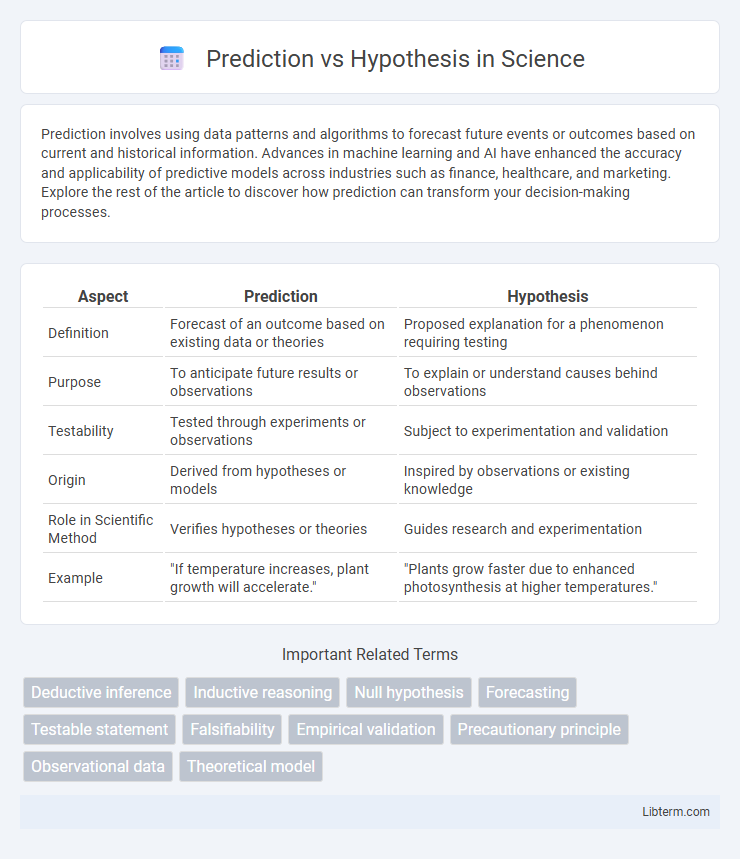Prediction involves using data patterns and algorithms to forecast future events or outcomes based on current and historical information. Advances in machine learning and AI have enhanced the accuracy and applicability of predictive models across industries such as finance, healthcare, and marketing. Explore the rest of the article to discover how prediction can transform your decision-making processes.
Table of Comparison
| Aspect | Prediction | Hypothesis |
|---|---|---|
| Definition | Forecast of an outcome based on existing data or theories | Proposed explanation for a phenomenon requiring testing |
| Purpose | To anticipate future results or observations | To explain or understand causes behind observations |
| Testability | Tested through experiments or observations | Subject to experimentation and validation |
| Origin | Derived from hypotheses or models | Inspired by observations or existing knowledge |
| Role in Scientific Method | Verifies hypotheses or theories | Guides research and experimentation |
| Example | "If temperature increases, plant growth will accelerate." | "Plants grow faster due to enhanced photosynthesis at higher temperatures." |
Understanding Predictions and Hypotheses
Predictions are specific statements about expected outcomes based on existing knowledge or theories, often quantifiable and measurable, while hypotheses are testable propositions formulated to explain phenomena and guide experimental inquiry. Understanding predictions involves anticipating results that can validate or falsify a hypothesis through empirical data collection and analysis. Hypotheses serve as foundational elements in scientific methods, driving the formulation of predictions that enable systematic validation and refinement of theories.
Key Differences Between Prediction and Hypothesis
A prediction is a specific, testable statement about what will happen in the future based on data or observations, while a hypothesis is a broader, tentative explanation for an observed phenomenon that can be tested through experimentation. Predictions are often derived from hypotheses and are measurable outcomes, whereas hypotheses provide the underlying rationale or theory that guides the formation of predictions. The key difference lies in their purposes: hypotheses propose possible explanations, and predictions specify expected results if the hypotheses hold true.
The Role of Predictions in Scientific Research
Predictions act as specific, testable statements derived from hypotheses that guide scientific experiments and observations. They provide measurable outcomes that can confirm or refute a hypothesis, fostering objective evaluation in research. This role ensures scientific progress by enabling researchers to validate theories through empirical evidence.
Formulating a Strong Hypothesis
Formulating a strong hypothesis involves creating a clear, testable statement based on existing knowledge and observations, predicting an expected outcome that can be empirically verified through experimentation or data analysis. A well-crafted hypothesis must be specific, measurable, and falsifiable, serving as the foundation for structured research and guiding the design of experiments to validate or refute the prediction. Distinguishing between prediction and hypothesis is crucial; while a hypothesis explains an anticipated phenomenon, a prediction directly forecasts the result under certain conditions, ensuring scientific rigor and focused inquiry.
Language Structure: Prediction vs Hypothesis
A prediction in language structure is a specific statement about what will happen based on prior knowledge or evidence, often expressed in future tense. A hypothesis functions as a testable explanation or assumption that guides investigation, typically framed as an if-then statement. While predictions forecast outcomes, hypotheses propose underlying causes or relationships for those outcomes.
Common Examples in Real-World Scenarios
Prediction in real-world scenarios often involves forecasting outcomes based on data trends, such as weather forecasting or stock market analysis, where algorithms predict future conditions. Hypotheses are commonly used in scientific experiments, like testing the effect of a new drug on disease symptoms, where an initial assumption is made and then tested through controlled studies. Both prediction and hypothesis play crucial roles in decision-making across industries, with predictions relying on existing patterns and hypotheses driving experimental research.
Importance in Experimental Design
In experimental design, a clear distinction between prediction and hypothesis is crucial for accurate data interpretation and validation. A hypothesis provides a testable statement based on existing knowledge, serving as the foundation for designing experiments, while a prediction offers a specific expected outcome derived from the hypothesis. Emphasizing this difference enhances the reliability of experimental results and guides systematic investigation.
How to Test Predictions and Hypotheses
Testing predictions involves designing experiments or observations to gather empirical data that either supports or refutes specific forecasted outcomes based on existing theories. Hypotheses are tested by formulating clear, falsifiable statements and conducting controlled experiments or systematic observations to evaluate their validity through measurable evidence. Statistical analysis and reproducibility of results play crucial roles in confirming or rejecting both predictions and hypotheses in scientific research.
Misconceptions About Predictions and Hypotheses
Misconceptions about predictions and hypotheses often arise from conflating their distinct roles in scientific inquiry. A hypothesis is a testable statement based on existing knowledge, designed to be supported or refuted through experimentation, whereas a prediction is a specific outcome expected if the hypothesis is correct. Many misunderstand that predictions are guesses without basis, but they are logically derived from hypotheses and critical for validating scientific theories.
Practical Applications in Various Fields
Predictions utilize data-driven models to forecast outcomes in finance, weather forecasting, and healthcare diagnostics, enhancing decision-making through empirical evidence. Hypotheses serve as testable propositions in scientific research, guiding experimental design in fields like biology, physics, and social sciences to validate theories. Both tools are essential: predictions apply existing knowledge to anticipate future events, while hypotheses drive innovation by challenging current understanding.
Prediction Infographic

 libterm.com
libterm.com